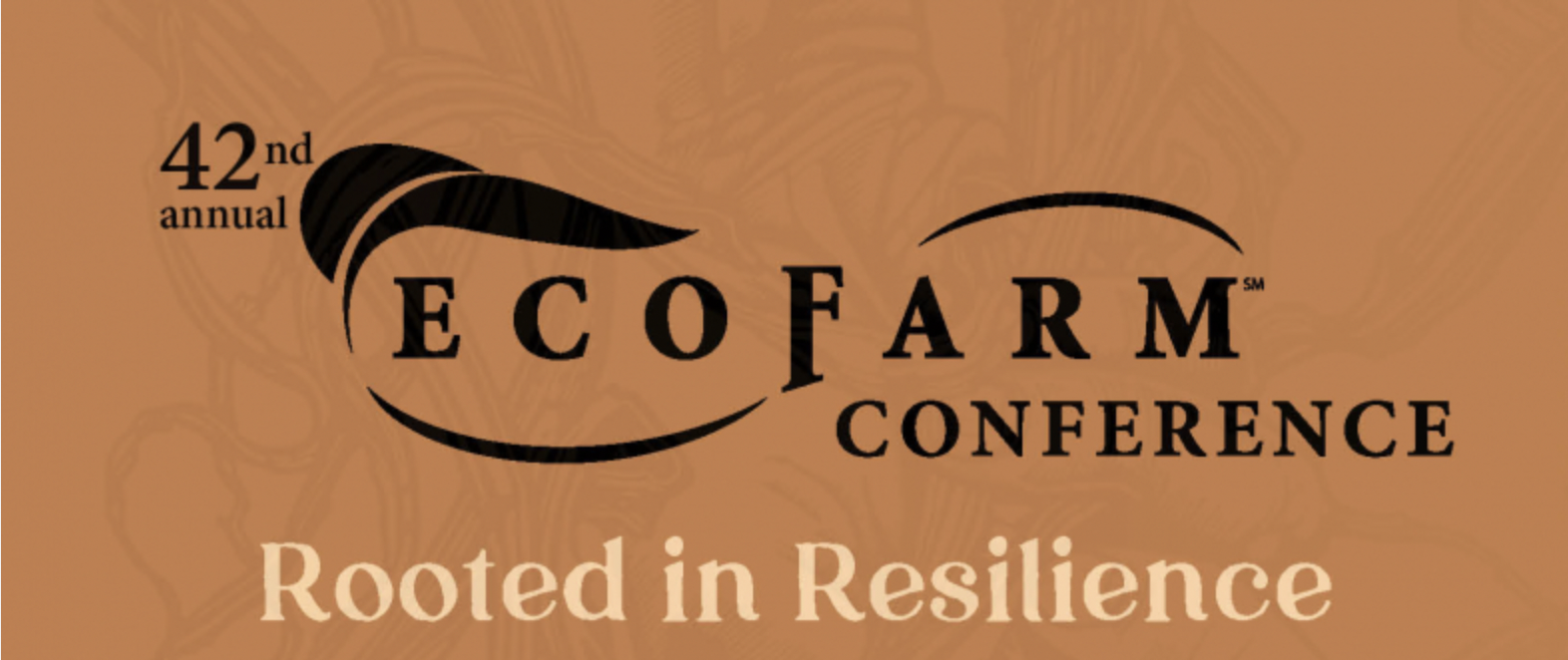
Mar 17, 2022
EcoFarm honors sustainable agriculture advocates
The Ecological Farm Association (EcoFarm) presented the Steward of Sustainable Agriculture Awards and the Advocates for Social Justice in Sustainable Agriculture Awards during an EcoFarm Conference award ceremony.
This year’s Susties are awarded to the Agriculture & Land-Based Training Association (ALBA), David Katz and Karen Van Epen, and Richard Smith.
EcoFarm developed the Steward of Sustainable Agriculture, or “Sustie,” to honor people who have been actively and critically involved in ecologically-sustainable agriculture and have demonstrated their long-term, significant contributions to the well-being of agriculture and the planet.
The Advocate of Social Justice, or “Justie,” award honors outstanding individuals who have been active advocates for social justice as a critical aspect of ecologically-sustainable agriculture and food systems.
Sustie Awards
Agriculture & Land-Based Training Association (ALBA)
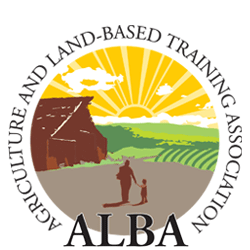 The Agriculture and Land-Based Training Association (ALBA) is a 501(c)3 non-profit based in the heart of the Salinas Valley. As a pioneer of the farmworker-to farmer movement, this year marks ALBA’s 20th anniversary of incubating farm businesses. ALBA has provided intensive education to over 500 participants, roughly 90% of whom are of Latino descent. Of these, some 200 have launched farm businesses on ALBA land and over 100 went on to farm independently. Indeed, currently, at least 35% of organic farms in Monterey County are affiliated with ALBA. The organization is recognized as a leader in training immigrant farmworkers through a culturally sensitive program that values and builds upon participants’ skills and experience, enabling them to earn greater economic and personal freedom. ALBA’s 5-year Farmer Education and Enterprise Development (FEED) program offers a rare and unique opportunity for immigrant farmworkers, and other aspiring farmers, to leverage their farming skills and work ethic toward career advancement and farm ownership.
The Agriculture and Land-Based Training Association (ALBA) is a 501(c)3 non-profit based in the heart of the Salinas Valley. As a pioneer of the farmworker-to farmer movement, this year marks ALBA’s 20th anniversary of incubating farm businesses. ALBA has provided intensive education to over 500 participants, roughly 90% of whom are of Latino descent. Of these, some 200 have launched farm businesses on ALBA land and over 100 went on to farm independently. Indeed, currently, at least 35% of organic farms in Monterey County are affiliated with ALBA. The organization is recognized as a leader in training immigrant farmworkers through a culturally sensitive program that values and builds upon participants’ skills and experience, enabling them to earn greater economic and personal freedom. ALBA’s 5-year Farmer Education and Enterprise Development (FEED) program offers a rare and unique opportunity for immigrant farmworkers, and other aspiring farmers, to leverage their farming skills and work ethic toward career advancement and farm ownership.
Richard Smith
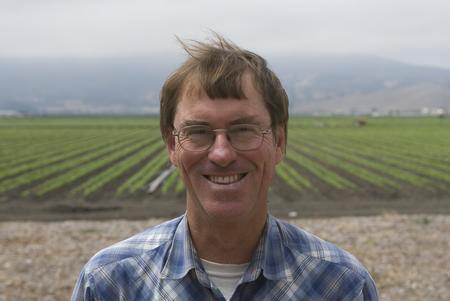
Richard Smith is the long-time vegetable crops and weed science farm advisor for Monterey, Santa Cruz and San Benito counties. He has enthusiastically researched nutrient and pest management in organic crop production. He worked tireless to assist growers from small to large-scale farmers in solving production problems and developing practices to improve crop and soil quality. Smith was honored in 1996 with the first-ever Pedro Ilic Agricultural Award for an outstanding educator, sponsored by the UC Small Farm Program. Richard has been actively involved with EcoFarm and, starting in 1990, he served for many years as a co-facilitator of the annual Bus Tour. He was an unflagging advocate for increasing the use of cover crops and worked with growers on evaluating varieties and novel ways of including them in production systems. He was editor of the UC publication Cover Crops for Vegetable Production.
David Katz
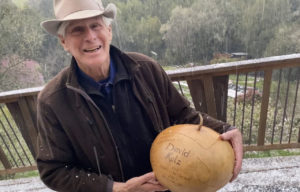
Throughout a varied career, David has continually forged new paths in farming, farmland conservation, farmer access to land, and improving the ecological benefits provided by working lands. UC Davis wouldn’t offer a degree in organic farming in the late 1960s so he created his own degree (calling it AgroEcosystem Dynamics) and promptly started farming. At Odyssey Orchards near Winters, he and his partners hosted apprentices and became among the first to introduce certified organic products to the California market. In the 1970s he co-founded California Certified Organic Farmers, the Committee For Sustainable Agriculture, the Davis Farmers Market, and the Farallones Institute Rural Center in Sonoma County. The latter attracted and trained a generation of forward-thinking environmentalists and dedicated sustainable farmers, laying the physical and cultural groundwork for what is now the Occidental Arts and Ecology Center. In the early 1980s, David helped organize the first Ecological Farming Conference and was appointed by Governor Brown to be President of the California Reclamation Board, testifying before Congress on numerous occasions about how to integrate new green thinking into the management of California’s water system. In 1985 he and his wife Karen Van Epen founded Ag Access Corporation, a Davis bookstore and publisher of ag and horticultural books, as well as a leading provider of agricultural information services prior to advent of the internet.
Karen Van Epen
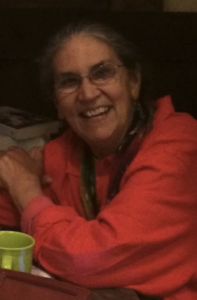 Karen Van Epen has educated, informed and nurtured generations of California organic farmers and enthusiasts. Born in 1946, Van Epen grew up in California’s Santa Clara Valley, called the Valley of Heart’s Delight because of its abundant blooming apricot, cherry and plum orchards. Her father was a mechanical engineer who invented and supplied machines for the Valley’s many fruit canneries. She worked in the canneries during high school and college.
Karen Van Epen has educated, informed and nurtured generations of California organic farmers and enthusiasts. Born in 1946, Van Epen grew up in California’s Santa Clara Valley, called the Valley of Heart’s Delight because of its abundant blooming apricot, cherry and plum orchards. Her father was a mechanical engineer who invented and supplied machines for the Valley’s many fruit canneries. She worked in the canneries during high school and college.
Van Epen went to UC Davis in 1964 where she met and married David Katz. While still in school they founded and began farming organically at Odyssey Orchards near the small town of Winters in Yolo County. In the late 1960s, Odyssey Orchards began to offer on-farm apprenticeships.
In 1974 Katz and Van Epen founded the Farallones Institute Rural Center, in Occidental, Sonoma County, where they offered college credit in Whole Systems through Antioch College. The curriculum spanned diverse aspects of ecology, sustainability, gardening, art, building, community life, and environmental issues, echoing the worldwide green movement, and laid the foundation for what is today the Occidental Arts and Ecology Center. Van Epen went on to found and edit Farmer to Farmer magazine for the Community Alliance with Family Farmers (CAFF).
Justie Award
Isao Fujimoto
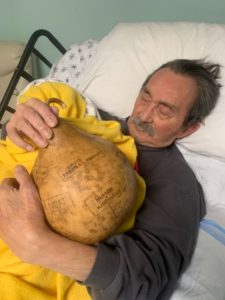 Isao Fujimoto’s life’s work has been to lift up the voices of the marginalized. He has pursued this through community-engaged research on indigenous peoples in the Philippines and farm workers and immigrants in California’s Central Valley. His undaunted but humble commitment to speaking truth of power along with his teaching and mentorship has inspired generations of UC Davis students to pursue careers to advance social justice. Fujimoto started the community development program and Asian American studies programs there. As a lecturer, he is known for his deep commitment to justice and his laughter.
Isao Fujimoto’s life’s work has been to lift up the voices of the marginalized. He has pursued this through community-engaged research on indigenous peoples in the Philippines and farm workers and immigrants in California’s Central Valley. His undaunted but humble commitment to speaking truth of power along with his teaching and mentorship has inspired generations of UC Davis students to pursue careers to advance social justice. Fujimoto started the community development program and Asian American studies programs there. As a lecturer, he is known for his deep commitment to justice and his laughter.
Alongside his students, Fujimoto was instrumental in creating important City of Davis institutions such as the Davis Farmers Market and the Davis Co-Op. His mentoring and guidance of students at UC Davis, many of whom are owners of well-known organic farms (Full Belly, Good Humus, Capay Organics), is what got the organic movement and farmers markets going in California. He was also assistant director of NCAT during the late 70’s when there was a rift between NCAT administrators and technical experts.
Fujimoto was born on the Owakma Indian Reservation in Eastern Washington. Due to the Alien land laws directed towards Asian communities, his family was not permitted to buy or lease land in the Western U.S. The reservations were exempt from enforcing these laws and therefore leased to Japanese immigrant families like his who farmed. During WWII his family was sent to Japanese internment camps including Heart Mountain camp in Wyoming, and Tule Lake, California. He was interred for thre and a half years, after which he and his family settled near Dublin, California. Fujimoto’s lived experiences have fueled his commitment and lifelong contributions to social justice and community development. Fujimoto, who passed away in March just after being informed of the award, was honored during the award ceremony.






